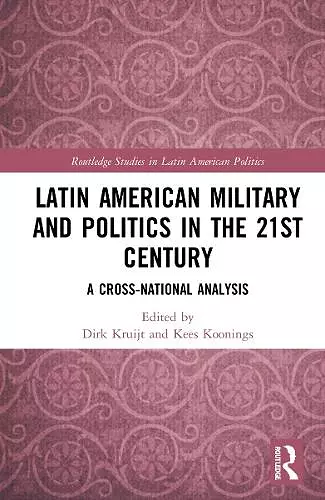Latin American Military and Politics in the Twenty-first Century
A Cross-National Analysis
Kees Koonings editor Dirk Kruijt editor
Format:Paperback
Publisher:Taylor & Francis Ltd
Published:29th Jan '24
Currently unavailable, and unfortunately no date known when it will be back
This paperback is available in another edition too:
- Hardback£135.00(9780367757786)

This volume offers a comparative analysis of the role of the military in Latin America in domestic politics and governance after 2000.
Divided into four parts covering the entirety of Latin America, the book argues that the Latin American military as semi-autonomous political actors have not faded away since 2000 and may even have been making a comeback in various countries. Each part outlines scenarios which effectively frame the various pathways taken to post-military democratic society. Part 1 critically examines textbook cases of political demilitarization in the Southern Cone, Peru, and Costa Rica. Part 2 contrasts the role of the military in the post-2000 politics of two regional powers: Brazil and Mexico. Part 3 examines the political role of the military facing ‘violent pluralism’ in Colombia and the Northern triangle of Central America. Finally, Part 4 identifies country cases in which the military have been instrumental in the rise, sustenance, and occasional demise of left wing revolutionary projects within Venezuela, Cuba, Nicaragua, and Bolivia.
Latin American Military and Politics in the Twenty-First Century will be of interest to scholars, students and professionals in the fields of Latin American history, international relations, military studies and studies concerning democracy, political violence and revolution in Latin America elsewhere.
"Has the political role of the military endured or re-emerged in Latin-America since the new millennium? This is the central question of this book, a fundamental and timely contribution to understand the current state of civil-military relations in the region. It offers analytical depth, comparative focus, and empirical diversity. A must read."
Helena Carreiras, Director of National Defense Institute, Portugal, and Associate Professor at the Instituto Universitário Lisboa
"In this insightful book, nineteen senior analysts of civil-military relations combine rigorous scholarship with local expertise to demonstrate the new political roles assumed by Latin American militaries during the 2000s, from the old political militarism of the Cold War decades to renewed civil-military politics. This book should be a required read for practitioners and scholars interested in Latin American politics and militarism."
Yagil Levy, Professor of Political Sociology at The Open University of Israel and Vice-President of the Israeli Sociological Society (ISS)
"In this outstanding volume Kruijt and Koonings have managed to provide a solid and genuinely comparative analysis of the Latin American military in domestic politics and governance during the last two decades. They convincingly demonstrate that the Latin American armies have been able to retain their importance in national imaginaries and their role as a semi-autonomous political actor in many countries of the region."
Patricio Silva, Professor of Modern Latin American History, Leiden University
"In times of great uncertainties, this book explores with deep insight the civic-military politics in Latin America, offering different analysis of the military role in the region. Democratic governments must provide access to essential public goods where security is a central priority, together with safeguarding human rights, political dialogue, and inclusive participation."
Josette Altmann-Borbón, Secretary-General of the Facultad Latinoamericana de Ciencias Sociales (FLACSO)
"Where are the Latin American military today and what are they up to? This question is as important as it is absent from the contemporary political and academic debate. This book is necessary because it fills an analytical gap and because it insightfully dissects the various strategies developed by the Latin American armed forces to preserve a relevant role in the (post?-)democratic political arena. With its exceptional line-up of authors, the work identifies a fourfold dynamics that mark the military in different countries: returning to the barracks, playing a latent yet central role, engaging in low-intensity violent confrontations, and sustaining political regimes."
Salvador Martí i Puig, Professor of Political Sciences at the University of Girona and researcher in CIDOB-Barcelona
"Illuminating how Latin American militaries have adapted to a new twenty-first century reality, this ambitious collection by renowned specialists shows how the region’s armed forces, rather than retiring to their barracks, have in fact found multiple and diverse ways to influence politics under democratic—and not-so-democratic—regimes."
Lilian Bobea, Assistant Professor at Fitchburg State University, Massachusetts, USA and former co-chair of Latin American Studies Association section ‘Defense, Public Security and Democracy’
"This book is a welcome contribution to the field of civil-military relations that captures the diverse relations between the armed forces and society in Latin American countries. The richness lies in the diversity of the chapters, that capture the underlying power dynamics that problematize the influence of the military in politics, the economy, and broader civil society within the unique context of each country."
Lindy Heinecken, Vice-Dean Research, Faculty of Arts and Social Sciences, Stellenbosch University
ISBN: 9780367759490
Dimensions: unknown
Weight: 426g
272 pages